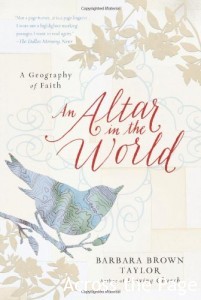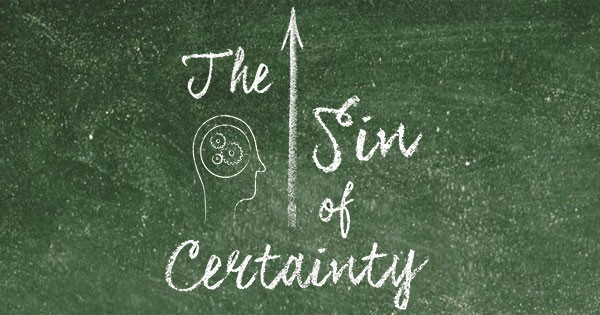An Altar in the World
 An Altar in the World: A Geography of Faith is a beautifully written contemplation on the ways ordinary living can intersect with the divine. Barbara Brown Taylor writes about the everyday disciplines that become portals into God’s presence: paying attention, wearing skin, getting lost, encountering others, feeling pain. It was not surprising to discover late in the book that Brother Lawrence is one of Taylor’s spiritual mentors, because in one important way her perspective resembles his: no earthly activity is too humble to be a meeting place with God.
An Altar in the World: A Geography of Faith is a beautifully written contemplation on the ways ordinary living can intersect with the divine. Barbara Brown Taylor writes about the everyday disciplines that become portals into God’s presence: paying attention, wearing skin, getting lost, encountering others, feeling pain. It was not surprising to discover late in the book that Brother Lawrence is one of Taylor’s spiritual mentors, because in one important way her perspective resembles his: no earthly activity is too humble to be a meeting place with God.
An Altar in the World is an eminently practical book. Each chapter proposes not a theory or teaching, but a practice. I liked this feeling of being anchored in the good world God made. Taylor writes poetically, and with a wit that reminded me a little of Anne Lamott without the shock value. Taylor is an Episcopal priest who left parish ministry to teach college, and though I come from a different theological background I found her to be a delightful guide — honest, wry, and at times profound.
I’ve quoted several passages from the book over the last few days. But I wanted to include another from the chapter on feeling pain, where Taylor discusses the book of Job. She comments,
One night of real pain is enough to strip away your illusions about how strong you are, how brave, how patient and faithful. Who would have thought that a torn cornea could hurt all the way down to the soles of your feet? Who would have imagined that a really bad case of food poisoning could make you doubt the mercy of God? You do not need a torturer standing over you to recognize the direct link between pain and truth. Pain is so real that less-real things like who you thought you were and how you meant to act vanish like drops of water flung on a hot stove. Your virtues can become as abstract as algebra, your beliefs as porous as clouds.
See what I mean? Over and over as I read, I felt the pull to buy the book (I read a library copy) just for the pleasure of owning words like that. The chapters on pain, Sabbath, paying attention, and wearing skin were favorites out of the dozen practices addressed.
The chapter on prayer didn’t resonate with me as well; I felt a little lost. I couldn’t really relate to Taylor’s reluctance to say that God answers prayer:
The meaning we give to what happens in our lives is our final, inviolable freedom. Only you can say whether God answered you. If you have any sense, you will ask someone with more experience than you to help you decide what the answer means, but even then the choice is yours. Are you still waiting for God to answer you, or is your life the answer you have been seeking, hiding in plain view?
While I would agree that God’s dialogue with us is personal — a fact that Jesus illustrates over and over in the gospels by answering other questions than the ones people are actually asking him — I don’t think it’s helpful to open up a question about whether he answers at all. Scripture seems pretty plain on that: he does. Even though we all struggle at times with what seems like his silence.
I also think that though Brother Lawrence was onto something in offering his activities and bodily life to God — we are to do “everything in word or deed as unto God” — there is also a verbal component to prayer that I certainly need. I get tired of it sometimes; it’s a burden to be always having to formulate words in prayer, and I will lapse into phases of wordless, rather vague meditation “in God’s presence.” But then I’ll wake up in the middle of the night some night — as happened recently — and realize, “I miss you, God.” It’s my words that somehow form a bridge, a meeting ground. They offer some terms in which God’s answers can be recognized, whether through insight or solution or event or transformed perspective. I need the mundane labor of words, and I need the commitment of words, in my relationship with God — even though temperamentally, I’m someone who seems always to be craving silence.
An Altar in the World engaged me on several levels and I found it deeply satisfying. It sends me back into my life with a heightened sense of its richness. It is full of altars, and full of purpose — something I know, but which seems more real after having read this.



5 Comments
Amy @ Hope Is the Word
This sounds good, though I find books that seem to scoff (not scoff, maybe, but dismiss) what I believe to be true (that God does answer prayer, for example) hard to take sometimes.
hopeinbrazil
Thanks for another great book suggestion.
Jess
this sounds like the kind of book I would love. I am going to look for it! thanks.
Carrie, Reading to Know
Hmm…quite interested in this one.
Carrie, Reading to Know
P.S. love the quote re: pain. So true!